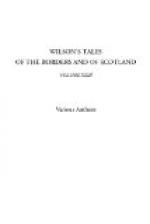mouth opened at the same time, and remained open, but
said nothing. His large eyes stared wildly around.
At length his teeth chattered, and the text was announced,
though half the congregation disputed it. “My
brethren!” said he once, and the whiteness of
his countenance increased; but he said no more.
“My bre—thren!” responded he
a second time; his teeth chattered louder; his cheeks
became clammy and death-like. “My brethren!”
stammered he a third time emphatically, and his knees
fell together. A deep groan echoed from his mother’s
pew. His wildness increased. “My mother!”
exclaimed the preacher. They were the last words
he ever uttered in a pulpit. The shaking and the
agony began in his heart, and his body caught the
contagion. He covered his face with his hands,
fell back, and wept. His mother screamed aloud,
and fell back also; and thus perished her toils, her
husband’s prayer, her fond anticipations, and
the pulpit oratory of her son. A few neighbours
crowded round her to console her and render her assistance.
They led her to the door. She gazed upon them
with a look of vacancy—thrice sorrowfully
waved her hand, in token that they should leave her;
for their words fell upon her heart like dew upon
a furnace. Silently she arose and left them,
and reaching her cottage, threw herself upon her bed
in bitterness. She shed no tears; neither did
she groan, but her bosom heaved with burning agony.
Sickness smote Thomas to his very heart; yea, even
unto blindness he was sick. His tongue was like
heated iron in his mouth, and his throat like a parched
land. He was led from the pulpit. But he
escaped not the persecution of the unfeeling titter,
and the expressions of shallow pity. He would
have rejoiced to have dwelt in darkness for ever,
but there was no escape from the eyes of his tormentors.
The congregation stood in groups in the kirkyard, “just,”
as they said, “to hae anither look at the orator;”
and he must pass through the midst of them. With
his very soul steeped in shame, and his cheeks covered
with confusion, he stepped from the kirk door.
A humming noise issued through the crowd, and every
one turned their faces towards him. His misery
was greater than he could bear. “Yon was
oratory for ye!” said one. “Poor
deevil!” added another, “I’m sorry
for him; but it was as guid as a play.”
“Was it tragedy or comedy?” inquired a
third, laughing as he spoke. The remarks fell
upon his ear—he grated his teeth in madness,
but he could endure no more; and, covering his face
with his hands, he bounded off like a wounded deer
to his mother’s cottage. In despair he
entered the house, scarce knowing what he did.
He beheld her where she had fallen upon the bed, dead
to all but misery. “Oh mother, mother!”
he cried, “dinna ye be angry—dinna
ye add to the afflictions of your son! Will ye
no, mother?—will ye no?” A low groan
was the only answer. He hurried to and fro across
the room, wringing his hands. “Mother,”
he again exclaimed, “will ye no speak ae word?




